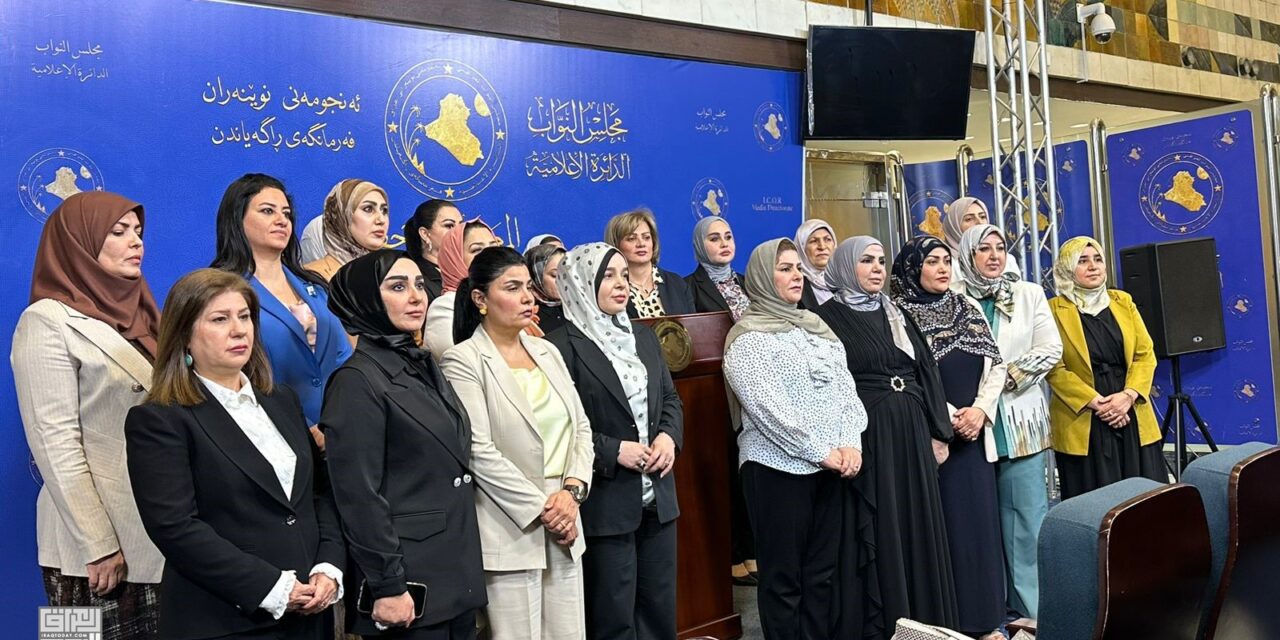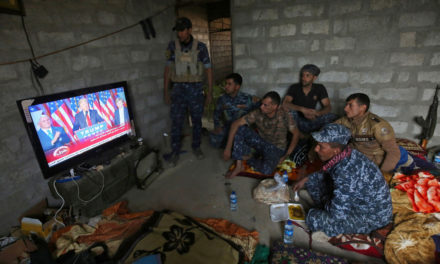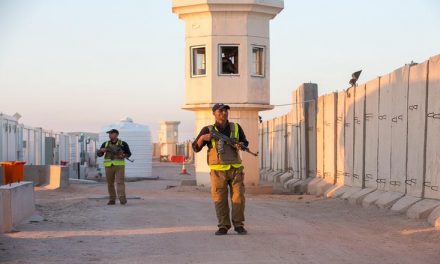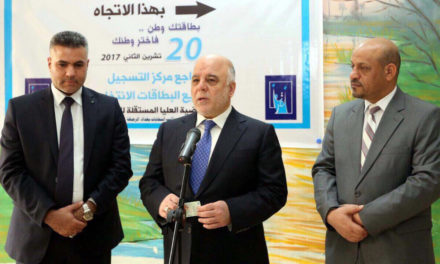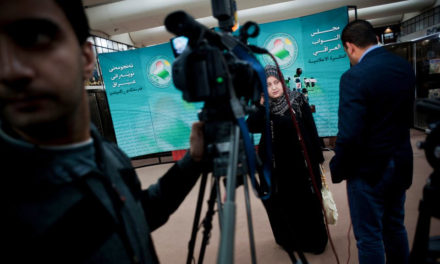(Iraqi female MPs unite to oppose amendments to the personal status law. Photo: Iraq Today)
In recent weeks, Iraqi civil society has come together to protest a proposed amendment to Iraq’s personal status law, fearing that it may aggravate sectarian division and erode the rights of Iraqi women. The amendment, which enjoys broad political support particularly from Shia Islamist parties, would allow religious rulings to govern issues of family law. More specifically, it would allow Iraq’s Muslim community to select between the current law from 1959, a Shia religious law, or a Sunni religious law. The religious codes would be set within six months of the law’s passing by special bodies in the Shia Endowment Office and the Sunni Endowment Office. If the Shia jurisprudential office arrived at a point of disagreement, the determining opinion would be that of the most followed cleric in Iraq, which today is Grand Ayatollah Ali Al-Sistani. This amendment would grant Iraq’s Shia religious establishment (the Marjayya) recognized legal power within the state. Prior to this, their influence was largely informal and amorphous. Presumably, Shia clerics should be enthusiastic about this development, but they have been careful in their response.
In order to understand their perspective, I spoke to several seminarians in Najaf in the last week and elicited their opinions about this current controversy in Iraqi politics. In a complementary article, I argued that Iraqi civil society activists should direct some of their efforts towards convincing the Shia religious establishment to oppose this amendment, given the key role they are expected to play in its implementation. To effectively do that, activists first need to understand the clerical perspective, and this article sets out to document that.
The Marjayya has been officially silent on the matter, but they are certainly on high alert and in dialogue among themselves. Grand Ayatollah Sistani is set to convene a meeting with other elite clerics in the upcoming days as well as with Iraqi civil society organizations, following the upcoming Arba’een pilgrimage. The most likely outcome of this meeting will be a decision to push for fine-tuning the amendments, rather than an outright rejection.
Politics and Public Opinion
From the clerical perspective, there are several issues in play. First, clerics understand the importance of public opinion. In recent years, the Marjayya tried to distance itself from unpopular and poorly performing Islamist parties in order to preserve its reputation. Public opinion polling from Iraq has shown that after a few years of declining trust in clerics, favorability of clerics has plateaued. Supporting an unpopular amendment may turn more Iraqis away from religious leaders. After all, public support is the foundation of clerical authority in the Shia tradition.
At the same time, it would be wrong to assume that the religious law has no supporters among the more conservative elements of Iraqi society. A recent online survey, which reached sixty thousand Iraqis across the country and abroad, was conducted by the Iraq Polling Team and found that 73.2% of respondents opposed the amendments. There is a concern that the survey only represents individuals who feel strongly (either way) about the amendments, but it is enough to demonstrate a strong public opposition. It is critical that activists demonstrate, through protests and petitions, the number of Iraqis who oppose this amendment. Unfortunately, it is precisely the demographic group that will be most affected by this – young women – that faces the largest social restrictions on protest.
Second, Shia clerics feel cornered by Islamist parties. In anticipation of early elections and given that the Marjayya has closed its doors to politicians, Shia Islamist parties are scrambling for religious legitimacy. They’ve positioned themselves to appear aligned with the religious establishment, catering to their conservative base. At the same time, they know that Shia clerics will not be able to easily reject this law. The ones who feel disquieted by it, or understand its consequences when it comes to public opinion, are fearful of appearing hypocritical. Then there are others who welcome an alignment between religious rulings and the law and view the 1959 law as outdated and incompatible with Iraqi society.
The Child Marriage Debate
For those who are receptive to the amendments, their argument against the current law is that because it contradicts religious law – in issues of divorce and custody, for example – it sets a precedent in Iraq for social instability and generates complex social problems. They also argue that it weakens respect for the law, because there will always be observant Iraqis who will normalize ignoring a court ruling in favor of a cleric’s ruling. They argue that this law would decrease the number of extra-legal marriages that take place.
The main cause for public outrage is that this law could pave the way for legalizing child marriage in Iraq, which already takes place illegally and is performed by clerics. According to a UNICEF report, 28% of Iraqi girls are married under the age of 18. The mechanism by which this would happen is that because some clerics set the age of maturity for girls as low as 9, this may mean that marriage would be allowed at a very young age. Here, the clerics I spoke with made it clear that they would work to put in place restrictions that would prevent child marriage. However, there are already concerns that the Marjayya can’t seem to control some clerics from conducting extra-legal child marriages, so what reason is there to believe that they could suddenly develop the capacity to do so? Moreover, how is child marriage defined by the clerical establishment and will they be in favor of setting an age limit?
Supporters of the amendments have also pointed out that the legal age of consent is low in many countries, including Western ones. It was only in 2023, for example, that Japan raised the legal age of consent from 13 to 16. Moreover, clerics point out that child marriage (defined as a marriage in which one side is below the age of 18) is legal in most of the United States, with only 12 of the 50 states setting the age of marriage to 18. Republican legislators in Wyoming, for example, have opposed even setting what they call an “arbitrary” age limit on marriage. While factually correct, these examples merely show that this is an issue that other countries confront, not that the laws in these countries should be emulated. After all, the United States lags far behind other Western countries in women’s rights. In other words, this argument merely showcases the hypocrisy of Western critics, but has little bearing on Iraq and outcomes for its citizens. Clerics have pointed out that this law is optional and that families can opt out of it. This, however, does not protect children as it is their parents who make that decision.
Finally, clerics have also emphasized that there is no established religious ruling that allows for child marriage. They also argue that in Shia jurisprudence, it is agreed upon that a father’s custody over his children dissolves if he does not take into account their emotional and physical well-being. In theory, if a father wants to marry off a child that is too young, this ruling would prevent him from doing so and would remove the child from his custody. In general, clerics tended to provide examples of religious rulings that they believe are positive and protective, such as the late Grand Ayatollah Muhammad Saeed Al-Hakim’s ruling that a second marriage (polygamous) is nullified if the first wife had requested to be the only wife in the marriage contract (which is not all that different from the current 1959 law). While these examples may exist, the underlying problem persists: how can we set a law that is based on multiple interpretations by different clerics – some relatively progressive and others regressive? Especially if that law concerns the rights of children?
The very process of clerical emulation showcases this complexity. When an individual Shia adherent selects a Grand Ayatollah for “emulation”, they examine that cleric’s rulings on different issues and picks the cleric that is most convincing to them. In many cases, an individual will abandon the ruling of their chosen cleric on a specific topic and seek an outside opinion. Leading to another query, how can such a personalistic and flexible jurisprudential model be applied to state law?
Religious Freedom or Fractionalization?
Despite the Marjayya’s genuine history of countering sectarianism, the clerics I spoke with did not believe that the law was divisive and were offended by the sectarian label. Rather, they believe that it is just to allow every religious community its own standards. Further, they point out that other religious leaders in Iraq, like Cardinal Louis Sako, have also expressed a desire for amendments to the personal status law. They cited several countries that have different religious laws for different communities as positive examples, such as Egypt, Morocco, and the United Arab Emirates. This difference in opinion can be attributed to the definition of sectarianism, where they don’t believe that designating family laws for citizens based on sect sets a legal framework for sectarianism.
Relatedly, critics have pointed out the absurdity of a parliament voting on relegating the legislative process to a secondary body, and not on the specific laws that the secondary body has proposed. In order to assess the impact of these laws on Iraqi society, Iraqis would need to see and debate them first. This argument is perhaps the one that may achieve some delays in the process of passing these amendments. The delays and the clarification of what the law would look like could give Iraqis more time to debate and understand what this means for them.
The Potential to Backfire
Clerics seem to have overlooked one way in which this law can backfire and hurt the religious establishment. For almost all of its history, the Shia religious establishment has been wary of state control. Numerous Iraqi regimes have complained about the Marjayya’s self-sufficiency and its disregard for state sponsorship. Clerics speak about this with pride. Now that the Iraqi government is dominated by Shia politicians, the Marjayya has relaxed its position towards the state, but this could be a mistake. The proposed amendment specifies a “cleric with the highest following in Iraq”, but that raises the potential of the state determining who the head of the Shia religious establishment is. Theoretically, it could result in competing claims that dilute Najaf’s authority. It could also subjugate Iraqi law to outside powers, if that clerical authority resided outside of Iraq, something that Grand Ayatollah Sistani – who has constantly criticized foreign involvement in Iraqi affairs – would, in theory, be opposed to.
The ongoing debate has only served to highlight the ambiguity of the amendments. This ambiguity not only puts women’s rights at immediate risk, but in the long-term has legal ramifications that could sectarianize the state beyond its informal political power-sharing structure. The least that is owed to future generations of Iraqis is clarity on the codes that may govern their lives.

Marsin Alshamary
Marsin Alshamary is an Assistant Professor of Political Science at Boston College.

